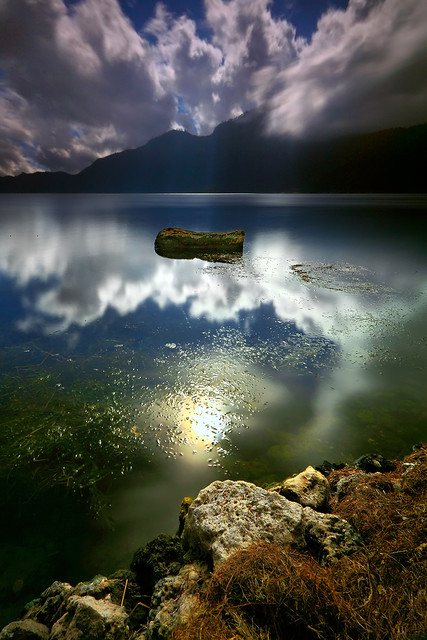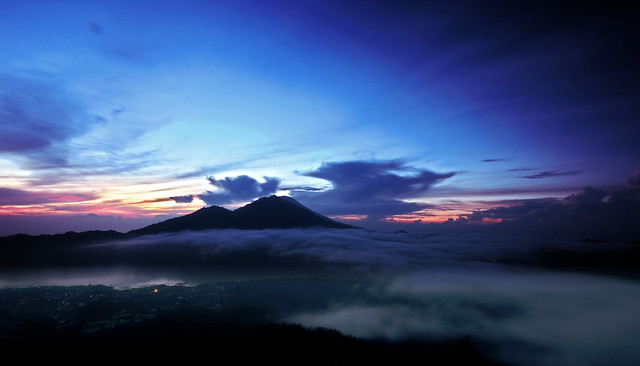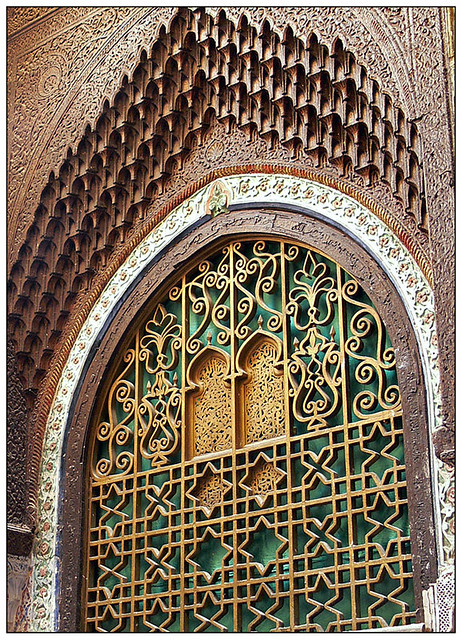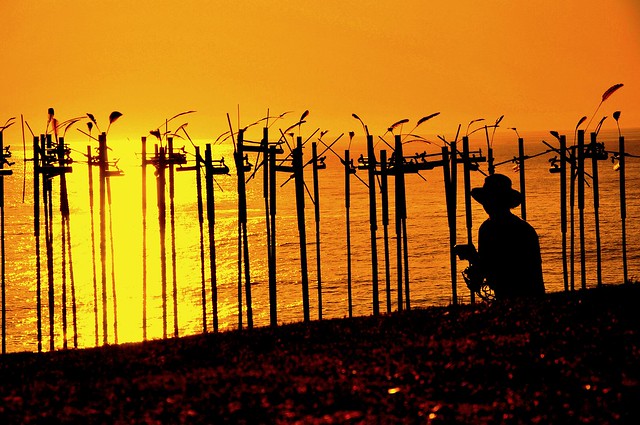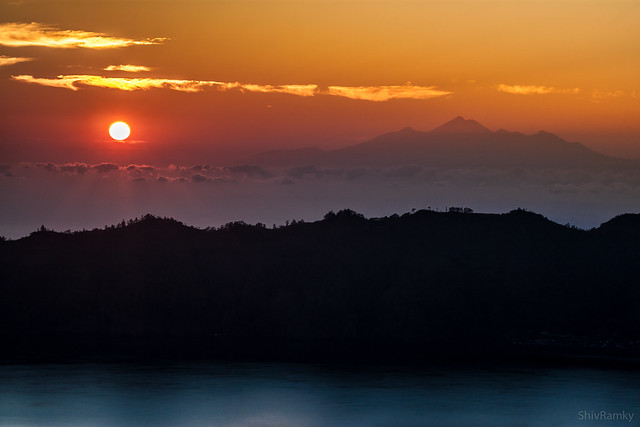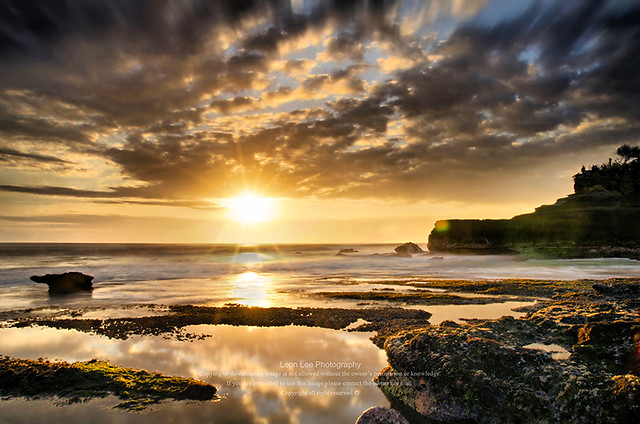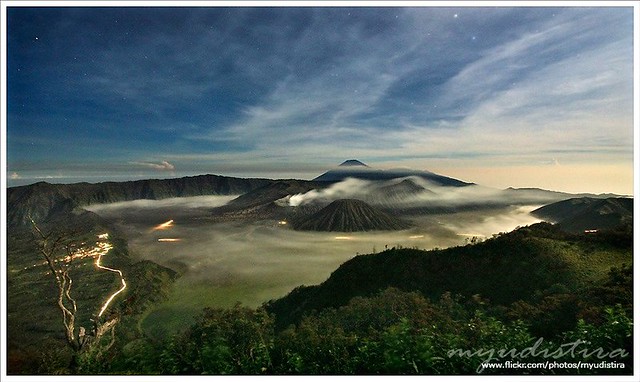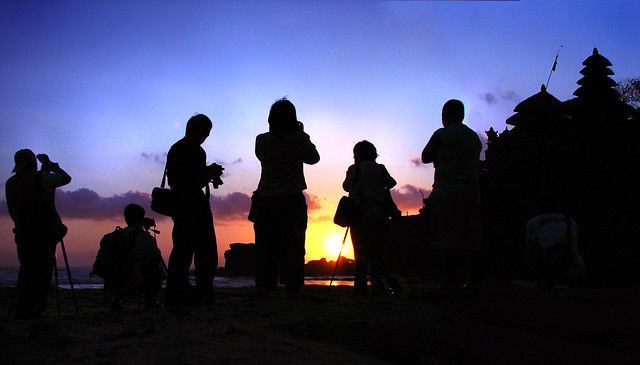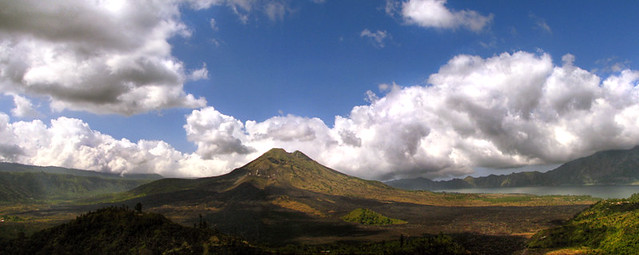Bali is a true treasure trove of natural beauty. The Indonesian island has a mixed bag of natural wonders, from dense jungles and food-laden forests, to active volcanoes, picture perfect rice fields, and mountains swarming with an exotic array of tropical plants.
We know it’s tempting to let every day float by under a beach brolly with a Bintang in hand, but if you get out and explore, you’ll see nature at its best.
Mountains and volcanos
Gunung Agung
If your mantra for mountains is ‘the bigger, the better’, then the Gunung Agung is most definitely for you. Standing at around 3124 meters tall, it is the highest mountain in Bali and is also an active volcano. Also referred to as ‘Mother Mountain’, you can see its peak from most of south and east Bali. You can climb Gunung Agung from various starting points, such as from Pura Besakih or Pura Pasar Agung, which are both popular routes depending on what you are after.
The climb up will take about six hours in total, so do yourself a favour a procure a guide that knows the best vantage points and low-risk routes like the back of his hand. It’s recommended to get to the top of the mountain before 8am (yep – that’s an early start!) before the clouds start gathering and ruin that panoramic view you worked so hard for.
Gunung Batukaru
Other wise known as the ‘The Coconut Shell Rock’, Gunung Batukaru is the second-highest mountain in Bali – but as we all know, it’s not always size that counts.
At 2276m tall, Gunung Batukaru isn’t as touristy as Gunung Agung and is surrounded by a bevy of beautiful scenery such as the Jatiluwih rice terraces and dense rainforests that stretch out below. You will also find one of Bali’s holiest temples, Pura Luhur Batukan, if you find yourself hankering for a cultural fix.
Even though Gunung Batukaru is shorter in stature than Gunung Agung, it will take you seven hours to climb due to the rugged terrain. Again, it is more than worth the cost to secure yourself a guide for the trek up to make sure you get to visit all the sweet spots.
Gardens
Bali Botanic Garden, Candikuning, Baturiti, Tabanan
If you love to check out the local botany on offer while on your travels, then it’s worth taking a gander at the Bali Botanic Garden, otherwise known as ‘Kebun Raya Eka Karya Bedugul’.
Here, you will find a gorgeous selection of local botanical treasures as well as a scientific research and education facility. The gardens are a great place for overseas visitors to explore the traditional uses of Balinese tropical plants, as the site features a herbarium and seed bank, as well as a number of glasshouses and nurseries.
One of the great things about this destination is that it is dedicated to the conservation of Bali’s natural environment and preserves over 2000 species of plants. The weather here is notoriously unpredictable, so bring an umbrella and jacket just in case.
Botanic Garden Ubud, Kutuh Kaja, Ubud
On road to Penelokan, you will find five hectares of themed Balinese gardens featuring glasshouses filled with orchids, Bali-grown plants such as cinnamon and vanilla, lotus ponds and an exhibit on the cacti of East Bali.
There’s a maze to get lost in, as well as an Islamic garden, Indonesian orchard and a meditation court with an ancient Banyan tree. This garden makes for a nice day of zen filled with assorted microclimates to explore and enjoy.
The garden is also near the Bird Village of Petulu, home of the famous white egrets, if you want to double up your nature fix for the day.
Waterfalls
Gitgit Waterfall, North Bali
Gitgit is one of Bali’s most impressive waterfalls. Located just 10 kilometers south of Singaraja. Gitgit is about 300 metres above sea level and is surrounded by thick tropical forests. The waterfall is accessible by car or motorbike and is only about 500 metres away from the main parking area, so you won’t really need a guide.
Along the pathway, you will see coffee plantations and clove trees – as well as the indistinguishable sight of colourful and well-placed vendors selling drinks and snacks.
If you don’t feel like dipping your toes into the water, the mist flying up from the waterfall will cool you down. You can also head further along and see the multi-tiered Gitgit Twin Waterfalls. Nothing soothes the soul like naturally flowing water.

Gitgit Waterfall in North Bali via baliilmare
Nungnung Waterfall, Nungnung Village, Badung
Down the bottom of hundreds of small steps is a deep hidden gorge with a breathtaking waterfall. About 70 meters of water thunders down into a pool below.
After walking down the epic number of steps, you can cool down in the clean water and see how far you can get close to the falling water. The spray coming from the force of water has some serious power! Make sure you have plenty of water and stretch out those thigh muscles for the trek back up the stairs.
There seriously seems to be many more on the way up as opposed to the way down.
Forests and green scapes
Jatiluwih rice terraces, Central Mountains
If you’re seeking an escape from the hustle bustle and want to immerse yourself in a different side of Bali – get yourself to the Jatiluwih rice terraces. And do it quickly.
These amazingly green rice fields are a great way to get your self acquainted with rural Bali and see why the terraces have been listed as a world heritage site by UNESCO. One of the best things about the Jatiluwih rice terraces is that you won’t find swarms of tourists traipsing around, as it’s not as easy to get to as other destinations. You will definitely need to hire a car or a driver, but the extra bit of effort will be well worth the trouble.
Uluwatu Monkey Forest, Bali
The Uluwatu Monkey Forest is, of course, known for its grey long-tailed macaques. But its furry monkey inhabitants aren’t all that it’s known for. The forest dwells along picturesque white cliff tops peppered with deep green forest and sweetly scented frangipani trees.
Then there is the stunning backdrop of the sea, which is spectacular come sunset for some souvenir photography to show off back home. In amongst the tropical greenery and striking flora and fauna, the forest is also home to a number of ancient temples, such as the Uluwatu Temple.
The wild monkeys tend to come out of their forest lodgings to hang out in the afternoon – keep in mind that their claws are as sharp as their faces are cute. As they are considered to be sacred animals in Bali, the locals and temple authorities feed them regularly – so don’t feel obliged to fill them up before their dinnertime.
West Bali National Park
West Bali National Park, also known as ‘Taman Nasional Bali Barat’, is a forested conservation area that makes up most of central-western Bali and features 19, 000 hectares of unique ecosystems ranging from different types of forests to mangroves, lowlands, mountains and savannahs.
Surrounded by clear water bays and idyllic beaches, the park is home to a diverse range of 300 different species of animals and birds, and is the original habitat of the endangered Bali Starling (Leucopsar rothschildi).
As you can imagine, this park is massive, so to get the most out of it you might want to look in to getting a guide from the park.
Tranquil beaches
Gili Meno
If you are really looking to immerse yourself in nature, with out the bother of tour busses and the fast moving pace of the main land, catch a boat to Gili Meno.
Gili Meno is the smallest of three small islands in the Bali sea known as The Gilies. It is actually so itty bitty that you can walk around it in about two hours, marvelling at the kind of beaches that are plastered on tourist postcards.
Full of white stretches of sand and clear blue sea, the island of Meno is as tranquil as it is beautiful. For animal lovers, there’s a Turtle Sanctuary full of adorable baby turtles and also Taman Burung bird park. With only a handful of bungalow-style accommodation to stay at and places to eat out in – Gili Meno is one of those special places that still feels secluded and dreamy.
Check out some of the coconut plantations or take a snorkel and discover the weird and wonderful paradise that lies below the sea’s surface. And don’t forget the baby turtles. They are just too cute!











